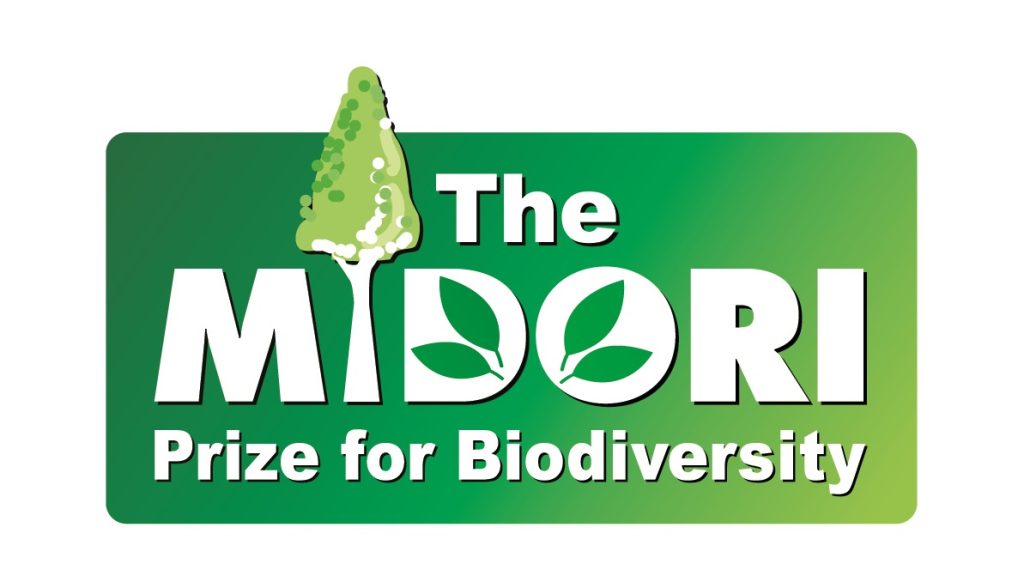
The call for nominations for The MIDORI Prize for Biodiversity 2024 is open until 15 June 2024. Nominations are invited from members of the public through the AEON Environmental Foundation website at https://www.aeon.info/ef/en/prize/midori/about.html
Co-organized by AEON Environmental Foundation and the Secretariat of the Convention on Biological Diversity (CBD), the Prize is awarded to individuals who make outstanding contributions to global biodiversity-related objectives, including the conservation and sustainable use of biodiversity, and other environmental issues such as climate change.
The 2024 edition will acknowledge contributions to the implementation of the Kunming-Montreal Global Biodiversity Framework, also known as the Biodiversity Plan, and its four overarching goals to protect and restore nature, to prosper with nature, to share benefits fairly, and to invest and collaborate for nature. Agreed in a landmark decision of CBD COP 15 in December 2022, the Biodiversity Plan is the world’s master plan to halt and reverse the loss of biodiversity.
Established by AEON Environmental Foundation during the 2010 International Year of Biodiversity, the Prize has been awarded to biodiversity champions in several fields, including policymaking, science and civil society, reflecting the need for a whole-of-society endeavour—a seminal principle that underpinned the design of the Biodiversity Plan and its 23 targets (to be achieved by 2023). Up to now, 19 individuals from 17 countries have received the prize.
The founder of the prize, Takuya Okada, Honorary Chairman of AEON Environmental Foundation and Honorary Chairman and Advisor, AEON Co., Ltd., said: “The conservation of biodiversity and the prevention of climate change are considered two of the most important environmental issues of the present day. The Foundation hopes that this prize will contribute to these global environmental issues and to the global goals outlined in the Kunming-Montreal Global Biodiversity Framework in December 2022.”
David Cooper, Acting Executive Secretary of the Convention on Biological Diversity, said: “Following the adoption of the Kunming-Montreal Global Biodiversity Framework in December 2022, the world community has been responding to the call to take urgent action for biodiversity. This edition of the MIDORI Prize for Biodiversity will honour individuals who support the mission of this Biodiversity Plan: to halt and reverse the loss of biodiversity by 2030. I invite you to also lead by example and be part of the Plan.”
The Prize will be awarded during the sixteenth meeting of the Conference of the Parties (COP 16) to the CBD to be held from 21 October to 1 November 2024 in Cali, Colombia, under the theme “Peace with nature”. To strengthen collaboration with the prizewinners, various initiatives to disseminate their activities are planned thereafter through 2025, such as holding forums in the prizewinners’ countries of origin.
The Kunming-Montreal Global Biodiversity Framework aims to catalyze, enable and galvanize urgent and transformative action by Governments, and subnational and local authorities, with the involvement of all of society, to halt and reverse biodiversity loss, to achieve the outcomes it sets out in its Vision, Mission, Goals and Targets, and thereby contribute to the three objectives of the Convention on Biological Diversity and to those of its Protocols.
The MIDORI Prize for Biodiversity aims to raise public awareness of the importance of biodiversity to human well-being and global issues, such as climate change, and to contribute to the objectives of the Convention on Biological Diversity and Kunming-Montreal Global Biodiversity Framework. It aims to support action for biodiversity and to inspire others by honouring individuals who have made major contributions to the conservation and sustainable use of biodiversity and by bringing attention to their achievements.
The MIDORI Prize for Biodiversity was established by AEON Environmental Foundation in commemoration of its 20th anniversary in 2010, which coincided with the United Nations International Year of Biodiversity and the 10th Conference of the Parties to the Convention on Biological Diversity (COP 10), held in Nagoya, Japan. Nineteen Prize winners have been selected so far and their work is relevant around the world.
Established in 1990, AEON Environmental Foundation continues to implement activities that respond to environmental issues in a changing world. In 2009, before the 10th meeting of the Conference of the Parties to the Convention on Biological Diversity (COP 10) held in Nagoya in 2010, the Foundation established a domestic award, the Japan Awards for Biodiversity, together with the Ministry of the Environment.
In 2010, in commemoration of its 20th anniversary, the Foundation established the MIDORI Prize for Biodiversity as an international award co-organized with the Secretariat of the Convention on Biological Diversity (SCBD).
From 2009 and 2010, respectively, the Japan Awards and MIDORI Prize were held every two years. On the occasion of the Foundation’s 30th anniversary, to further address the issue of biodiversity, these domestic and international awards were unified under the name of the MIDORI Prize for Biodiversity, and the Foundation is stepping up its support for environmental activities relating to biodiversity.
Currently, the Foundation is promoting activities with stakeholders in four areas: the Development of Forests, Funding, Environmental Education, and Partnership. A representative activity of AEON Environmental Foundation is tree-planting activities which have been carried out with volunteers all over the world, with a total number of trees planted exceeding 12.68 million. Going forward, the Foundation will continue to promote various environmental activities to pass on our beautiful planet, full of life, to future generations.
Opened for signature at the Earth Summit in Rio de Janeiro in 1992, and entering into force in December 1993, the Convention on Biological Diversity is an international treaty for the conservation of biodiversity, the sustainable use of the components of biodiversity and the equitable sharing of the benefits derived from the use of genetic resources.
With 196 Parties, the Convention has near universal participation among countries. The Convention seeks to address all threats to biodiversity and ecosystem services, including threats from climate change, through scientific assessments, the development of tools, incentives and processes, the transfer of technologies and good practices and the full and active involvement of relevant stakeholders including indigenous and local communities, youth, NGOs, women, and the business community. The Cartagena Protocol on Biosafety and the Nagoya Protocol on Access and Benefit Sharing are supplementary agreements to the Convention.
The Cartagena Protocol, which entered into force on 11 September 2003, seeks to protect biological diversity from the potential risks posed by living modified organisms resulting from modern biotechnology. To date, 173 Parties have ratified the Cartagena Protocol. The Nagoya Protocol aims to share the benefits arising from the utilization of genetic resources fairly and equitably, including by appropriate access to genetic resources and by appropriate transfer of relevant technologies. It entered into force on 12 October 2014 and to date has been ratified by 141 Parties.








